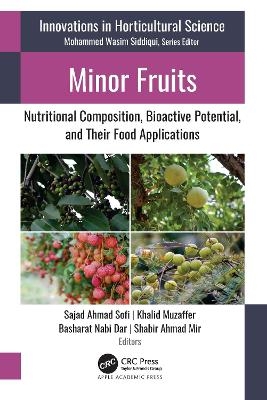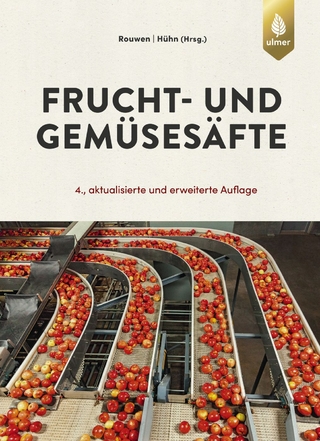
Minor Fruits
Apple Academic Press Inc. (Verlag)
978-1-77491-699-5 (ISBN)
- Lieferbar (Termin unbekannt)
- Versandkostenfrei innerhalb Deutschlands
- Auch auf Rechnung
- Verfügbarkeit in der Filiale vor Ort prüfen
- Artikel merken
Minor fruits are often recognized as "poor man’s crops" and include neglected, underutilized, and some rare fruits that can contribute high nutritional, medicinal, and antioxidant properties that are useful for health and curing many diseases. This book, Minor Fruits: Nutritional Composition, Bioactive Potential, and Their Food Applications, highlights the potential of minor fruits in the human diet and their health benefits due to presence of the rich source of phytochemicals, fiber, vitamins, and minerals.
The book is unique in that it provides a full-length study of several minor fruits and their nutritional and bioactive potential, general characteristics, and opportunities for their use in various functional food products. It also provides an overview of the postharvest techniques used for minor fruits to preserve quality, enhance shelf life, streamline fruit processing, and develop new value-added products. It also provides knowledge on the proper utilization of minor fruits in meeting the demand for food and nutritional security challenges growing worldwide by offering a promising alternative source of fruit and fruit-based products with health benefits.
Important features of the book include:
Highlights the importance of minor fruits in terms of nutrition and their role in combating malnutrition
Provides knowledge regarding the major minor fruits and their biodiversity
Details bioactive compounds of minor fruits and their health benefits
Looks at the role of minor fruits in combating diet-related diseases
Discusses minor fruit-based food products and their nutraceutical potentials
This book is a comprehensive reference written for teachers, scientists, researchers, students, and others with an interest in minor fruits and their use in fruit processing, value addition, byproducts, and their utilization for combating malnutrition and nutritional security.
Sajad Ahmad Sofi, PhD, is currently a Food Analyst at the Food Testing Laboratory, Department of Food Technology, IUST, Awantipora, India. He has been awarded with a gold medal for outstanding performance during his MSc degree program and an UGC award for a PhD fellowship. Dr. Sofi has more than 45 publications in internationally reputed journals as well as 10 book chapters. He is an active reviewer for many scientific journals of repute. He has attended several national and international conferences, workshops, and seminars. He received his MSc (Food Technology) degree from Islamic University of Science & Technology, Awantipora, India, and PhD (Food Science & Technology) degree from SKUAST, Jammu, India. Dr. Sofi has also qualified the National Eligibility Test in Food Technology conducted by the Indian Council of Agricultural Research. Dr. Khalid Muzaffar currently working as Postdoc Research Associate fellow at Department of Food Technology, Islamic university of Science and Technology, UT of Kashmir, India. Worked as a guest faculty at Government Boys Degree College Baramulla, J & K in the Department of Food Technology. Also worked as a Junior Research Fellow at university of Kashmir, Srinagar, J & K, India. Qualified National Eligibility Test conducted by Indian Council of Agricultural Research (ICAR) India. Got Maulana Azad National Fellowship from University Grant Commission, New Delhi, India. Has written one book, number of book chapters and has more than 40 publications published in reputed international journals. Attended and presented papers in many national and international conferences. Potential peer reviewer of reputed international journals related to Food Science and Technology that belong to popular publishing house viz. Elsevier, Taylor-Francis, Wiley, Springer etc. Recipient of Reviewer Recognition certificates from Elsevier, Taylor-Francis, Springer and Wiley Online. Basharat Nabi Dar, PhD, is a graduate in agricultural sciences and received his MS and PhD in food technology. Dr. Dar started his professional career in 2012 as Assistant Professor of Food Technology at IUST, Awantipora, India. He was a Visiting Scientist at the Institute of Food Science, Cornell University, in the United States under the CV Raman Fellowship of the University Grants Commission, India. He is the recipient of the UGC Research Award 2014–2016 in the field of agricultural sciences. Dr. Dar is on the expert panel of the Joint FAO/WHO Expert Meeting on Microbiological Risk Assessment (JEMRA) for the prevention and control of microbiological hazards in fresh fruits and vegetables. He is the coordinator of the Food Testing Laboratory sponsored by the Ministry of Food Processing and Industries, India. He is also associated with several research projects as a PI/Co-PI member. Recognition of his contributions has provided ample opportunity to collaborate, present talks, and interact with professionals, and Dr. Dar has an active presence in public policy discourse through his position as a technical expert to WHO/FAO and the GOI. He has edited 5 books and has more than 90 publications in his field. Shabir Ahmad Mir, PhD, is an Assistant Professor at the Government College for Women, Srinagar, India. Dr. Mir has published more than 90 international papers, book chapters, and edited five books. In addition to his close association with many scientific organizations in the area of food technology, he is an active reviewer for several scientific journals of repute, including Food Chemistry, Journal of Cereal Science, Journal of Food Science and Technology, Food Packaging and Shelf Life, and many others. He has also organized several conferences and workshops in food science and technology. He earned his PhD in Food Technology at Pondicherry University, Puducherry, India. During his PhD work, he received the Best Whole Grain PhD Thesis Award 2016 (South Asia) for outstanding research work by the Whole Grain Research Foundation, India.
1. Introduction to Minor Fruits 2. Amla 3. Bael 4. Quince (Cydonia oblonga) 5. Pomegranate 6. Passion Fruit 7. Mangosteen 8. Jamun 9. Litchi 10. Loquat 11. Sea Buckthorn 12. Rambutan 13. Mulberry
| Erscheinungsdatum | 07.01.2025 |
|---|---|
| Reihe/Serie | Innovations in Horticultural Science |
| Zusatzinfo | 12 Illustrations, color; 3 Illustrations, black and white |
| Verlagsort | Oakville |
| Sprache | englisch |
| Maße | 156 x 234 mm |
| Gewicht | 820 g |
| Themenwelt | Technik ► Lebensmitteltechnologie |
| ISBN-10 | 1-77491-699-1 / 1774916991 |
| ISBN-13 | 978-1-77491-699-5 / 9781774916995 |
| Zustand | Neuware |
| Informationen gemäß Produktsicherheitsverordnung (GPSR) | |
| Haben Sie eine Frage zum Produkt? |
aus dem Bereich


